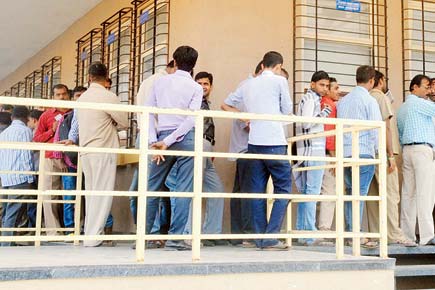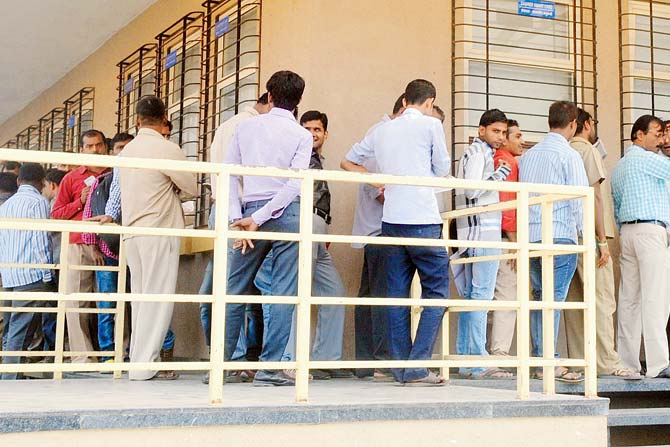A visit to any government office is more painful and time-consuming than it needs to be, because no one feels the need to change a thing


I, along with a few other desperate, hungry people, waited patiently. To not wait would mean returning to the office another day, when the clerk responsible for stamping something could well be on a long holiday. File pic for Representation
 I spent a little over three hours at the Regional Transport Office this week. I did it to punish myself, because I knew I had the option of simply paying any of the hundreds of agents sitting outside to get my work done, but chose not to. Even the person behind the counter of a stationery store nearby offered to help, saying he happened to be an agent as well. I turned them all down because I thought I was brave enough. I was wrong.
I spent a little over three hours at the Regional Transport Office this week. I did it to punish myself, because I knew I had the option of simply paying any of the hundreds of agents sitting outside to get my work done, but chose not to. Even the person behind the counter of a stationery store nearby offered to help, saying he happened to be an agent as well. I turned them all down because I thought I was brave enough. I was wrong.
ADVERTISEMENT
The entrance to the office was blocked by more agents, all of whom spent their waking hours accosting hapless visitors and offering to get their work done for a ridiculous fee. To give you an example, a document attesting to the fact that I am a valid licence holder was offered to me for R700. I was told it would be delivered within a half hour too. The actual cost (if you manage to find the right department and actually find someone sitting behind the right desk during working hours) is R40. That's an astonishing amount of money distributed among all kinds of people for something that one, as a citizen, has a right to obtain for a nominal fee.
I could see why the agents thrived. All I needed was a change in my vehicle's Registration Certificate saying it was no longer hypothecated to any bank. I was directed to the second floor, where I spent 20 minutes trying to locate the right counter. Most counters were empty, which was surprising because this was 12 pm and employees were supposed to be at work until the 2 pm break for lunch. There were others like me, all waiting patiently for clerks to show up. Some spent a few minutes at their desks before vanishing for over an hour. There was no supervisor, and none of the clerks seemed to know where their missing colleagues were, or when they were expected to return.
Two hours after walking into the office, I managed to get all the required signatures -- four, if you're wondering, for reasons known only to the people who create these rules -- only to be told that paying the fee of R50 would be impossible because the building's Internet connection was mysteriously down. I decided to wait, and the connection was miraculously restored a few minutes before lunchtime, which is when the clerk attending to my documents asked for a few more, after conveniently failing to mention them at any time during the previous two hours. I had the additional documents, of course, because no one enters a government office without being armed with photocopies of papers that date back to the eighteenth century, all of which may be demanded by any employee for reasons that make sense to him or her alone.
After paying the fee in the nick of time, I returned to a room of empty desks, because the two or three employees around had decided to break for lunch. I was told to wait for an hour, a luxury no corporate office I have ever worked for has granted any of its employees. Working lunches are common in corporate India, but the words have yet to be uttered in any government office. And so, I, along with a few other desperate, hungry people, waited patiently. To not wait would mean returning to the office another day, when the clerk responsible for stamping something could well be on a long holiday. And so, we waited.
I finally walked out of the office with my receipt, three hours after setting foot inside, for a task that ought to have taken less than 10 minutes. Outside, people were still waiting, some trying to reconcile themselves to the fact that they would have to take another day off from work and return, others trying to bargain with agents who knew they could count on the conscious ineptitude of the officials inside to ensure a steady stream of paying customers.
The hardest thing about a visit to a government office of any kind is how it empties one of all hope.
How do people without time, money or an education deal with these labyrinths? How do they get their work done in the face of such stupefying indifference? And what do they say when a politician appears on television to talk about the ease of doing business and reassure the people of his state that he belongs to a government that cares?
When he isn't ranting about all things Mumbai, Lindsay Pereira can be almost sweet. He tweets @lindsaypereira
Send your feedback to mailbag@mid-day.com
The views expressed in this column are the individual's and don't represent those of the paper
 Subscribe today by clicking the link and stay updated with the latest news!" Click here!
Subscribe today by clicking the link and stay updated with the latest news!" Click here!







